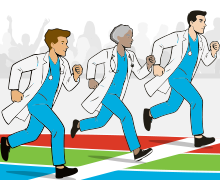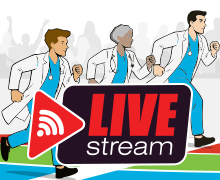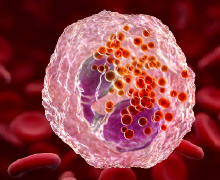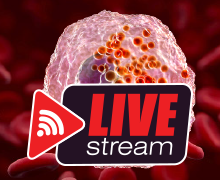Sunday, March 04, 2018
6:00 PM - 8:30 PM
Orlando, FL
Hyatt Regency Orlando
Windermere X (Convention Level)
Orlando, Florida
Jonathan Corren, MD
Associate Clinical Professor of Medicine and Pediatrics
David Geffen School of Medicine at UCLA
Director, Allergy Medical Clinic
Los Angeles, California
Reynold A. Panettieri, Jr., MD
Professor of Medicine
Robert Wood Johnson Medical School
Vice Chancellor, Translational Medicine and Science
Director, Rutgers Institute for Translational Medicine and Science
New Brunswick, New Jersey
Emeritus Professor of Medicine
University of Pennsylvania
Philadelphia, Pennsylvania
Michael E. Wechsler, MD, MMSc
Professor, Department of Medicine
Co-Director, The Cohen Family Asthma Institute
Division of Pulmonary, Critical Care and Sleep Medicine
Director, Asthma Program
National Jewish Health
Denver, Colorado

This activity is provided by Integritas Communications.
This activity is supported by an independent educational grant from Sanofi Genzyme and Regeneron Pharmaceuticals.
This program is not sponsored or programmed by the AAAAI/WAO.
This program does not qualify for continuing medical education (CME) credit.
Dinner will be provided.
Target Audience
The educational design of this activity addresses the needs of allergists/clinical immunologists, pulmonologists, and other clinicians involved in the management of patients with severe asthma.
Statement of Need/Program Overview
An outsized proportion of asthma-related morbidity and mortality is borne by the 5% to 15% of affected patients who have severe forms of the disease.1,2 These patients suffer from poorly controlled symptoms and frequent exacerbations, often despite daily treatment with high-dose inhaled corticosteroids and other long-acting controller medications.1,2 Ongoing research has elucidated key pathophysiologic processes and other clinical parameters related to asthma severity and persistence.2,3 In many cases, the patient’s medical history, clinical presentation, and results from biomarker testing can help classify severe asthma phenotypically.2,3 Increasingly, this can allow physicians to personalize maintenance regimens using targeted therapies that reflect identified endotypes—ie, asthma phenotypes linked to specific underlying disease mechanisms and proinflammatory signaling cascades.2,4,5 Several biologic medications are now available to treat certain cohorts with severe asthma, and a number of other targeted agents are in late-stage development.5-7 Clinical immunologists, allergists, and other specialists who manage patients with severe asthma need to stay current on the latest published trial data for newer targeted therapies, approvals from the US Food and Drug Administration, and actionable best-practice recommendations on evaluating and treating patients with severe asthma. During this Clinical Issues™ program, a panel of expert faculty will discuss and debate a series of topics related to comprehensively evaluating and longitudinally managing patients with severe asthma, including how the evolving evidence base should shape clinical decision-making and implications of new study data presented at the 2018 Joint Congress of the American Academy of Allergy, Asthma, & Immunology and World Allergy Organization.
References
- Levy ML. The national review of asthma deaths: what did we learn and what needs to change? Breathe (Sheff). 2015;11(1):14-24.
- Chung KF, et al. International ERS/ATS guidelines on definition, evaluation and treatment of severe asthma. Eur Respir J. 2014;43(2):343-373.
- Wan XC, Woodruff PG. Biomarkers in severe asthma. Immunol Allergy Clin North Am. 2016;36(3):547-557.
- Lötvall J, et al. Asthma endotypes: a new approach to classification of disease entities within the asthma syndrome. J Allergy Clin Immunol. 2011;127(2):355-360.
- Fajt ML, Wenzel SE. Asthma phenotypes and the use of biologic medications in asthma and allergic disease: the next steps toward personalized care. J Allergy Clin Immunol. 2015;135(2):299-310.
- Bousquet J, et al. Care pathways for the selection of a biologic in severe asthma. Eur Respir J. 2017;50(6):1701782.
- Walsh GM. Biologics targeting IL-5, IL-4 or IL-13 for the treatment of asthma—an update. Expert Rev Clin Immunol. 2017;13(2):143-149.
Educational Objectives
Upon completion of this activity, participants will be better able to do the following:
- Discuss severe asthma heterogeneity and disease biomarkers with a focus on Th2 cell–mediated pathophysiologic mechanisms
- Evaluate patients with severe asthma for symptom severity, exacerbation history, comorbidities, disease phenotypes, and prior treatment responses
- Differentiate the clinical profiles of current and emerging biologic medications for patients with severe asthma
- Individualize therapeutic regimens for patients with severe asthma based on disease phenotypes, ongoing assessment of symptoms, exacerbation risks, and comorbid conditions
Program Agenda
6:00 PM - 6:30 PM Registration
6:30 PM - 6:45 PM Severe Asthma: Pathophysiology, Heterogeneity, and Burdens
6:45 PM - 7:15 PM Patient Evaluations: Biomarkers, Phenotypes, and Comorbidities
7:15 PM - 7:45 PM Targeted Biologic Therapies for Severe Asthma
7:45 PM - 8:15 PM Personalizing Asthma Management: Case Studies and Patient Perspectives
8:15 PM - 8:30 PM Question and Answer Session
Americans with Disabilities Act
Event staff will be glad to assist you with any special needs (ie, physical, dietary, etc). Please contact Katie Anderton prior to the live event at kanderton@integritasgrp.com.
Fee Information
There is no registration fee for attending this program; however, seating is limited. Preregistration does not guarantee seating. We recommend arriving at the symposium location early.
Register Now


28
2026
SM Challenge
Competing to Master the Management of NonAdvanced SM
| Time: | 6:00 AM-8:00 AM ET |
| Venue: | Philadelphia Marriott Downtown |
| Location: | Philadelphia, PA |
| Faculty: | Brian Chernak, MD; Matthew P. Giannetti, MD ; Anne L. Maitland, MD, PhD |


28
2026
SM Challenge
Competing to Master the Management of NonAdvanced SM
| Time: | 6:30 AM-8:00 AM ET |
| Venue: | Live Stream |
| Location: | Live Stream |
| Faculty: | Brian Chernak, MD; Matthew P. Giannetti, MD ; Anne L. Maitland, MD, PhD |

01
2026
Tackling Eosinophilic Disorders
A Focus on Eosinophilic Granulomatosis with Polyangiitis and Hypereosinophilic Syndrome
| Time: | 6:00 AM-8:00 AM ET |
| Venue: | Philadelphia Marriott Downtown |
| Location: | Philadelphia, Pennsylvania |
| Faculty: | Anisha B. Dua, MD, MPH; Flavia Hoyte, MD; Michael E. Wechsler, MD, MMSc |

01
2026
Tackling Eosinophilic Disorders
A Focus on Eosinophilic Granulomatosis with Polyangiitis and Hypereosinophilic Syndrome
| Time: | 6:30 AM-8:00 AM ET |
| Venue: | Live Stream |
| Location: | Live Stream |
| Faculty: | Anisha B. Dua, MD, MPH; Flavia Hoyte, MD; Michael E. Wechsler, MD, MMSc |






